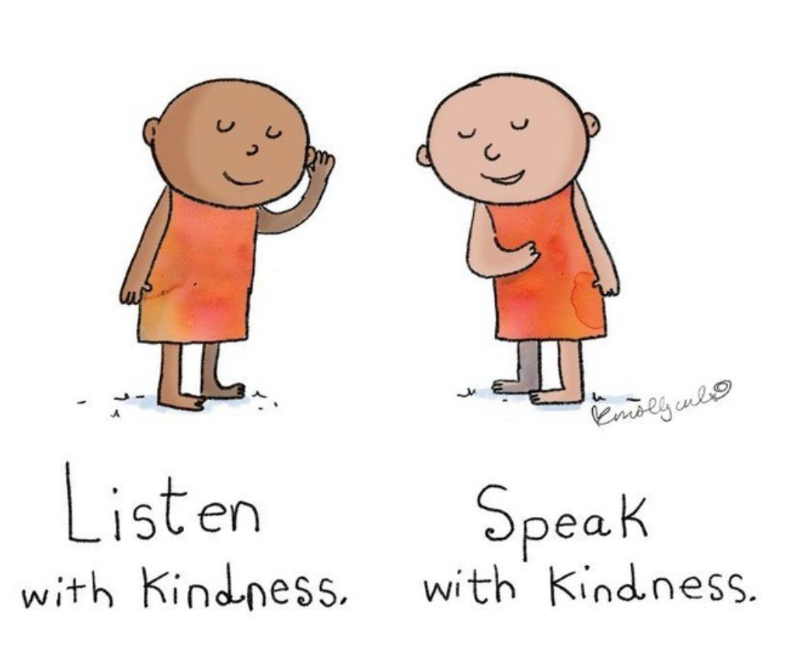
With the rise of the internet and social media, people have become less empathic in how they communicate. Rudeness and deceptive language are common both in the online and offline world. One way to overcome this is to have a code of ethics that can keep us in check. The Buddhist teachings of Right Speech is one path we can take to master the art of communication with empathy. Learn more about the guidelines of Right Speech and how they can support you and make our world a kinder place.
“When words are both true and kind, they can change the world.”
— Buddha
The internet has changed the way we communicate. For better or worse, it has revolutionized communications to the extent that it is now our preferred medium – via email, texting, or social media comments.
High-speed internet has removed all communication barriers, but it’s also removed accountability and eroded empathy. Between TikTok rants and Twitter feuds, rudeness and deception have become commonplace in the jungle of social media.
Online trolls and ‘haters’ lurk in these spaces and will jump at any opportunity to be mean because they feel empowered to share their opinions, even if it’s based on scant knowledge.
Why do they do it? Because they can get away without facing any lasting consequences. Behind their screens, they can mask their identities and block anyone who has a problem with what they want to say.
While social media exacerbates the lack of empathy in our communication, it still exists in our face-to-face interactions. Chances are you have said something in your life that you later regretted.
In the spur of the moment, you may have blurted out a few choice words or acted out without thinking things through. What usually follows is a sinking feeling in your stomach and a parental-like voice inside your head that says, “Uh oh, you probably shouldn’t have said that!”
I’ll admit that I’ve been guilty of this behavior myself, especially in my younger years. As a strong-minded and outspoken individual, I always took pride in expressing my views with unbridled passion. Only later did I learn the importance of responding intentionally and tactfully.
I studied books and courses to become a more mindful communicator. One school of thought that was particularly effective was the Buddhist teachings of ‘Right Speech,’ one of the moral disciplines of the Buddhist Noble Eightfold Path. Right Speech, also called Wise Speech or Virtuous Speech, goes deeper than not speaking obscenities – it’s a way of life. Something you can practice every time you speak and try to master the art of communication.
What is Right Speech in Buddhism?

Right Speech is one of the components of the Noble Eightfold Path, which Buddha defined as “abstinence from false speech, abstinence from malicious speech, abstinence from harsh speech, and abstinence from idle chatter.”
In everyday vernacular, it means not lying, gossiping, raising your voice, swearing, or using words to create discord and express hostility or cynicism.
To practice Right Speech effectively, we must develop and employ other aspects of the Eightfold Path, such as Right Intention, Right View, Right Action, Right Livelihood, Right Effort, Right Mindfulness, and Right Concentration.
It’s important to note that “Right” is not a moral judgment that implies being wrong or bad. It is a path that can “lead to happiness for oneself and others.” The Noble Eightfold Path is considered a path to liberation that can create freedom, happiness, inner peace, and release us from suffering.
What is Wrong Speech?
The Buddha highlighted the importance of using our human capacity when speaking and interacting with others, and taught us what to cultivate and avoid to achieve that.
Wrong speech outlines these four distinct patterns and behaviors to avoid if we engage in empathetic communication.
1. Lying: Cheating, lying, and deceiving others. If we cheat or lie, we will lose other people’s trust, and nobody will believe us.
2. Speaking harshly: Being impolite, rude, or using abusive language. This includes yelling, swearing, and abusing others. This not only hurts others but can cause people to avoid us.
3. Speaking divisively: Speaking in ways that cause disharmony and create rifts in other people’s relationships. Ruining relationships is a surefire way to sabotage your connections with others.
4. Engaging in idle chatter: Indulging in idle talk that’s unproductive, like gossip, can reduce your credibility and make you look petty in the eyes of others. Interrupting others with non-stop talking can come across as insensitive and abrasive.
If keeping these four guidelines in mind is a little too much, you can always follow the golden rule that Thumper, the baby rabbit from the animated classic cartoon “Bambi,” lived by: “If you can’t say something nice, don’t say nothing at all.”
Why does using Right Speech matter?

Practicing the four aspects of Right Speech is much more than simple “thou shalt nots” and refraining from the four types of wrong speech. It entails using language in a beneficial way from a heart-centered place. This is the missing component when it comes to the art of communication.
Doing so will make us feel good about ourselves and make the world a better place. That’s because words are heavily laced with meaning and energy.
Dr. Masaru Emoto, who conducted the famous water crystal experiments, posited that words can have a transformative impact on a molecular level.
When words like “joy, love, gratitude” were taped on water containers, frozen, and observed under a microscope, the crystals looked like beautiful snowflakes. When words like “hate and fear” were used, the crystals appeared asymmetrical and disfigured.
You can feel the power of words whenever you pray, listen to the lyrics of a moving song, read poetry or exchange words of love and affection with another. Being immersed in this verbal flow will instantly boost your vibration. On the other hand, when we utter words of anger, hate, and disgust, we can sense the disconnection from the light within us and our energy plummeting to lower frequencies.
Knowing the beneficial impact on us and others can motivate us to internalize and intentionally commit to the guidelines of Right Speech and support the ethical scaffolding that it offers our society.
Putting Right Speech into action

Now that we know how to avoid the harms of engaging in Wrong Speech and the virtuous rewards of following Right Speech, we can look at how we can master the art of communication with empathy by applying Buddha’s teachings on Right Speech in everyday life.
With the right intentions and keen observation of your patterns, you can instigate change with these six steps:
1. Observe and manage any triggers.
Humans are habit-loving creatures. We prefer to stick with what feels familiar and natural to us. We run on auto-pilot unless we intervene and examine our behavior.
For example, when arguing with someone who is annoying you, you might be tempted to say hurtful things to them. In that instant, you’re in pain and convinced that if you “set them straight,” you’ll feel better. In these moments, you’ve got to overcome the impulse to say precisely what’s on your mind without filtering it.
This involves distinguishing the belligerent voice of your ego from the still inner voice of your Wise Self, which knows that we should avoid Wrong Speech that consists of gossip, bragging, rude remarks, complaining, and acerbic comebacks at all costs.
2. Pause and shift your state of being.
If you feel overwhelmed by your emotions and think you’ll say something you’ll later regret, take a step back. Anger, sadness, and fear induce an agitated state of being. These physiological changes can diminish your ability to act sensibly.
The key to preventing knee-jerk reactions is taking a time out. It provides the time and space to gain perspective on your problems.
3. Self-reflect.
Every situation offers an opportunity for healing and growth. Situations and conversations that unsettle us are worth examining because they often indicate past wounds we haven’t addressed. Your defense system would not be triggered if you weren’t sensitive about a particular issue.
If we feel tempted to engage in Wrong Speech by speaking harshly, lying, or gossiping, we might inquire: Am I tired? Am I stressed? Am I afraid of getting hurt or rejected? Am I motivated by ill will, validation, or greed? Getting to the root is the first step to moving toward good intentions and projecting that in our speech.
4. Review your intentions and communicate effectively.
Once you regain balance, you’ll be better positioned to respond and speak with empathy rather than reacting to what you’re facing.
You can engage in a state of inquiry by asking yourself these five questions from the THINK framework before speaking:
T – Is what I’m saying true?
H – Will what I say be helpful?
I – Will what I say inspire?
N – Is what I’m saying necessary and needed at this time?
K – Am I speaking in the spirit of kindness and goodwill?
Once you’ve answered these questions, you can decide whether you would like to move forward. If you choose to say something, you must figure out the best way to communicate your thoughts to others.
5. Engage in Right Listening.
Right Listening is more than just listening to sound using our ears. It requires deep listening, which occurs when we engage our full attention. It means listening to a person’s voice, facial expressions, pauses, underlying meanings, gestures, and nuances embedded in what they communicate.
Vietnamese Zen master Thich Nhat Hanh said:
“Deep listening is the foundation of Right Speech. If we cannot listen mindfully, we cannot practice Right Speech. No matter what we say, it will not be mindful, because we’ll be speaking only our own ideas and not in response to the other person.”
The next time someone speaks to you, try listening at a deeper level, and you’ll be surprised about the various layers of meaning you’ll decipher in their message. You’ll develop a deeper appreciation for the speaker and feel a stronger connection with them – an essential part in the art of communication.
Actress and humanitarian Audrey Hepburn once said that for beautiful lips, we should speak only words of kindness. Her profound insight implies that beauty is innate when it comes to the art of communication. When we communicate with empathy, we gain admirers of our character – a deeper admiration that comes with respect and appreciation.
All my best on your journey,
Seline

Question for you: What is the biggest hurdle in mastering the art of communication? Which Right Speech guidelines can help you overcome it?
Did you like this post? Sign up below, and I’ll send you more awesome posts like this every week.

Love all of this. As an empath, this is something I think far too many people do not fully understand or at the very least far too many people underestimate the power of living and speaking with empathy. Thank you for sharing this with us and for bringing attention to this important aspect of life.
Im with you fellow empath! It is so hard to get people to understand what it is like at times. No one else seems to understand what I go through and what I feel every day. This was a good blog to find! I think it helps to know we are not alone and as hard as it is there are people who understand and even appreciate what empaths like us bring to the world!